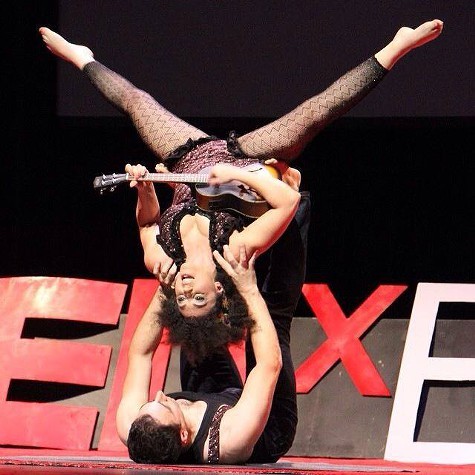On Saturday morning, more than 1,700 attendees crowded into Zellerbach Hall at UC Berkeley to attend the annual TEDxBerkeley conference, an event created to spark dialogue on topics such as female empowerment, environmental protection, and technological innovation. Designed to mimic the intellectually stimulating atmosphere of TED Talks — the international forum that brings together top innovators, artists, and world leaders to generate world-changing initiatives — TEDxBerkeley is independently organized and allows participants to elevate local ideas to a global platform.
The conference was divided into three ninety-minute sessions: “rethink,” “redefine,” and “recreate.” Each session featured an eclectic collection of speakers whose presentations illuminated the latest thinking in their fields of expertise.
[jump]
In the opening moments of the conference, Guy Kawasaki, a special advisor to the Motorola business unit of Google, gave a memorable presentation on the inner workings of product innovation. Kawasaki, who urged young entrepreneurs to believe in their ideas in spite of discouragement from others, reminded the audience that Ken Olsen, the co-founder and former CEO of Digital Equipment Corporation, once wrongly predicted in 1977, “There is no reason anyone would want a computer in their home.”
Another highlight of the “rethink” session included a speech given by Leslie Lang, the senior vice president of Microclinic International, a global health nonprofit that targets chronic diseases in under-sourced communities around the world. Lang argued that chronic diseases — such as diabetes, heart disease, asthma, and obesity — are all “socially contagious” in that their prevalence correlates with dominant social behaviors and attitudes. Lang said, “By changing the way people think, we can give people a new chance at life.”
The second session of TEDxBerkeley, titled “redefine,” began with a visually and aurally stunning performance by Nikki Borodi, a San Francisco-based musician, aerial acrobat, and artist. Borodi dreamily strummed a ukulele and crooned hypnotically sweet melodies all while performing acrobatics with her partner, Vangelis Chaniotakis. At times upside down and seemingly weightless, Borodi twisted in and out of a series of beautiful bodily contortions as her flowing musical inflections reverberated throughout the performance hall. Setting the tone for the coming segment, Borodi vividly illustrated the capacity of the human mind to “redefine” reality and tap into deep reserves of boundless imagination.
A highlight of the “redefine” session came with a presentation given by desert biologist Tim Shields. Shields presented the idea of seamlessly merging together two seemingly discordant practices: gaming and conserving the environment. Citing the statistic that human beings play “156 billion hours a year of electronic games,” Shields argued that the “vast pool of human awareness contained in the game world” can be channeled into environmental protection efforts. Shields proposed cutting-edge technologies, such as rovers, submersibles, and aerial drones equipped with censors and GPS, that could be operated by gamers working to engender environmental changes on a global scale. Remotely located gamers, competing to produce the best results, could assist in the containment of invasive species in the Caribbean or monitor the movement of animal poachers in sub-Saharan Africa. “I call this endeavor crowd-sourced conservation,” Shields said. “If we make games of solving environmental and ecological puzzles, we can tap the vast creative potential of the playful human spirit.”
TEDxBerkeley concluded with the “recreate” session. Memorable moments included a chilling violin performance by Paul Rucker, a visual artist and composer who uses music to cope with the horrific realities of systematic racism in the United States, and a speech given by Edward Miguel, the faculty director of the Center for Effective Global Action at UC Berkeley, who predicted that climate change will have a particularly devastating impact on African nations.
For seven hours, the TEDxBerkeley conference brought together a vibrant collective of thinkers, dreamers, inventors, and visionaries. An electrifying spirit of innovation and intellectual vitality permeated the conference. Perhaps Nikki Borodi captured the message of TEDxBerkeley best when she said, “It’s time to be a pioneer and create something that doesn’t already exist.”












